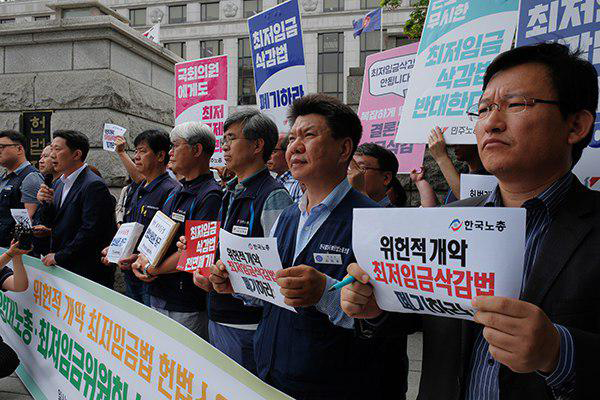
The decision recently released by the government to postpone the enforcement of punishment for those who violate the Minimum Wage Act and the statutory 52-hour workweek(including 12 hours of extended work per week) stirred up controversy.
The government explained the reasons to delay the enforcement, citing the sluggish economy and the burden imposed upon the business circle due to the consecutive minimum wage hikes soared over the past years and the soft landing of the working hour reduction at work. The government plans to amend the Enforcement Decree of the Minimum Wage Act to offer a self-adjustment period for the change of the wage system in relation to the expanded wage components of the minimum wage and to suspend the punishment for the violation of the working hour cuts for the duration of 9 months, adding 3 months more to the current 6 months. The labor and judicial circles denounce that “it is the abuse of power by the executive branch which should implement the system in accordance with the law.”
The State Council will pass the revised Enforcement Decree of the Minimum Wage Act on December 31, which was earlier scheduled for its passage on December 24. According to the final draft of the enforcement decree, the paid weekly holiday and allowances are included in the computation of the minimum wage but the contractual holidays and allowances agreed between workers and an employer will be excluded from its calculation.
The government decided to postpone the punishment by providing the workplace with more leeway for self-adjustment to the changes of the minimum wage system, in particular, likely change in the pay unit period of regular bonuses at work, as from next year regular bonuses and part of welfare benefits are included in the computation scope of the minimum wage. The revised enforcement decree is designed to help the workplaces which can avoid the law violation, when they change the payment unit period such as that of regular bonuses. It targets some workplaces that could be in violation of the Minimum Wage Act due to the problem of their wage system that the basic wage constitutes comparatively smaller, despite workers’ high annual gross wages.
The government also decided to extend the suspension period for the punishment of the employers who are in violation of the working hour reduction which expires on December 31 for the duration of additional three months until March next year. It seems that the government takes into account the amendment to the Labor Standards Act in February next year, as the social dialogue is currently going on in relation to the expansion of the unit period of the flexible working hour system.
The labor circle criticized about the amendment to the Enforcement Decree of the Minimum Wage Act that “it is absolutely a rational measure to include the paid weekly holiday allowance and working hours in the computation of the minimum wage, but now the methods of the computation of the minimum wage came to differ according to the application of the relevant enforcement decrees, because the contractual paid holiday pay and working hours which are included in the calculation of ordinary wages (in the Labor Standards Act) are taken out in the computation of the minimum wage.“
reported by Lee Eun-young
translated by Kim Sung-jin

